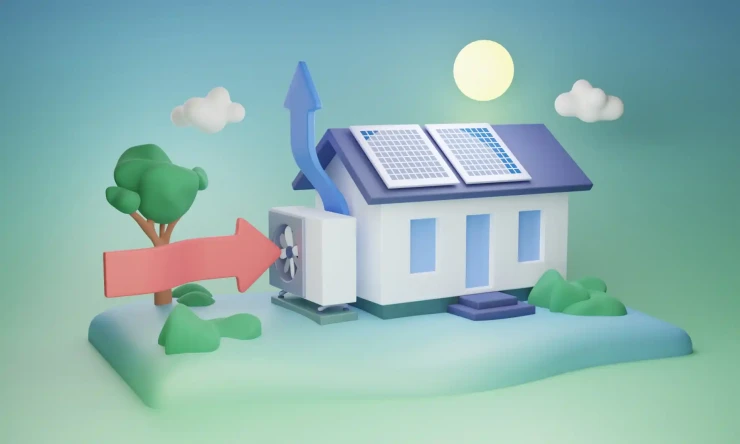New research from WWF and Scottish Power published in July has revealed how much households could save on their energy bills by installing low carbon technologies such as solar panels, EV chargers and heat pumps.
The study found that by installing these energy efficiency upgrades households could reduce their energy bills by up to £1,878 per year as wells as cutting their home carbon emissions by 95% over the lifetime of their installation. This reduction in energy bills includes the £586 per year boost to household finances delivered by installing solar panels through savings on electricity costs and earnings on surplus power sold back to the grid through the Smart Export Guarantee. The study also claims that embracing these technologies could add to the value of a property by an average of £10,000.
Detailed analysis of 5 million house sales in England and Wales found that installing an air source heat pump could increase the value of a home by approximately £5,000-£8,000, installing solar panels could increase it by between £1,350 and £5,400 and an electric vehicle charging point could increase it by about £5,000.
Interestingly, the report concluded that installing an air source heat pump, rooftop solar PV and EV charger could cost around £15,780 but this is set against the likelihood that these installations could add up to an extra £15,260 on the value of a home, making it clear how beneficial it is to adopt low carbon technologies.
The research is included within a new report entitled ‘Better Homes, Cooling Planet’. The report reached its conclusions after data was assessed from 5 million house sales in England and Wales alongside further technical analysis by BEAMA.
Concern continues to mount over alarmingly high utility bills forecast for this October and again in January 2023. It’s looking like energy bills could top £4,000 this winter as soaring wholesale gas prices, in part caused by the invasion of Ukraine, are passed on to consumers. Analysts are warning that prices could remain high for years. This is leading to more and more households looking at ways they can reduce their surging energy bills in the long term by installing solar panels, improving insulation, or buying air source heat pumps.
COMPARE PRICES FROM LOCAL INSTALLERS
Compare prices from local companies fast & free
Enter your postcode to compare quotes from leading professionals. We promise to keep your information Safe & Secure. Privacy Policy
The research shows that heat pumps could currently cost households £117 less per year to run than a gas boiler. Add this to the savings made by installing solar panels and it could make a big difference to household budgets and ease the cost-of-living crisis.
These figures are based on the renovation of a detached home in Southern England. Currently the home has an old boiler and poor insulation and faces annual energy bills of £2,816. It was calculated that the same home with a heat pump, solar panels, electric vehicle charger, and smart battery could pay as little as £383 per year for its energy.
Savings are greatly increased by combining a heat pump with good insulation. A home that is poorly insulated with an old boiler can expect to pay annual energy costs of around £2,416 per year but this falls hugely when a heat pump is combined with good insulation to around £1,512 per year.
According to the Energy Saving Trust solar panels typically cost between £2,900 and £6,700 to install, heat pumps cost between £7,000 and £13,000 and electric vehicle charging points about £1,000.
The report also revealed that buying an electric vehicle would result in considerable savings when compared to the to the cost of maintaining a petrol or diesel-fuelled vehicle. Drivers could save between £194 and £572 per year. Savings could be even greater if a home has a rooftop solar array and a battery energy storage system while time of use tariffs could offer further savings for EV drivers.
The ‘Better Homes, Cooling Planet’ report has also taken into consideration how long it could take for these upgrades to pay for themselves in energy and fuel savings. Their research found that drivers break even on an investment in an EV in just one to three years, while it takes between 10 and 15 years for energy bill savings and Smart Export Guarantee payments to offset the upfront costs of solar panels, and 20 years for heat pumps to pay for themselves. The figures also depend on the location and condition of the house. That said, heat pumps are likely to go down in price as they become more popular and the cost of running a gas boiler will become more expensive as they are phased out towards their total ban in 2035.
However, the benefits aren’t just financial. The report revealed that insulation, air source heat pumps and solar panels could also reduce a home’s lifetime carbon emissions from energy by up to 91 tonnes of carbon dioxide which is equivalent to taking 42 fossil fuel cars off the road.
Rob McGaughey, head of smart heat at ScottishPower, said:
“Home installations of heat pumps, solar panels and electric vehicle chargers can help both move the country away from its reliance on fossil fuels and address the climate crisis.”
With about 20% of the UK’s carbon emissions coming from homes and a further 15% from cars, these home improvements are vital if the UK is to reach its net zero carbon emissions target by 2050.
Isabella O’Dowd, head of climate at WWF-UK, said:
“Accelerating the rollout of low-carbon technologies and energy efficiency is the best way to ensure the UK’s energy security, shield homeowners from the high price of fossil fuels and protect the planet.”
She recognised, however, that the upfront costs of these technologies are a barrier for many households particularly those on low incomes.
She added:
“We would like to see financing mechanisms put in place by government to help people have more access to support in terms of reducing the upfront costs.”
O’Dowd also called for tax incentives for private landlords to install low carbon technologies as well as stronger consumer protection and advice.
Drawing on its conclusions, the report recommends a number of initiatives and changes for policy makers to ensure that as much of the population as possible can benefit from low carbon technologies.
An analysis by the National Grid Electricity System Operator (ESO) found that ‘insufficient initiatives’ mean the UK will likely miss its target to boost its home pump installations to 600,000 per year by 2028. Households are currently eligible for a £5,000 grant to switch to low-carbon heating under the Boiler Upgrade Scheme, which launched in April and runs until 2025. The scheme has proved to be controversial up to now with the Ground Source Heat Pump Association recently accusing the government of failing to drive interest. The grid operator noted that the government is only offering enough funding to support 90,000 installations over 3 years.
WWF and Scottish Power’s report also notes that often homeowners struggle to find reliable information about decarbonising their homes.
Drawing on its conclusions, the report recommends a number of initiatives and changes for policy makers to ensure that as much of the population as possible can benefit from low carbon technologies. It particularly recommends that low-income households are targeted. To date, successive policies for energy efficiency upgrades have failed with no replacement for the much-maligned Green Home Grant yet. The report urges the government to launch an ‘energy advice and support service’ and to promote high standards and training in the supply chain to promote consumer confidence and demand.
The report calls for the government to fulfil its commitment within the heat and buildings strategy in order to rebalance policy costs on energy bills. The government has begun to work towards this through its proposed reforms to the electricity market and the potential scaling up of the Boiler Upgrade Scheme as well as extending it beyond 2025.





























